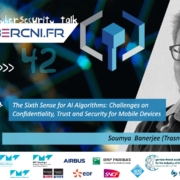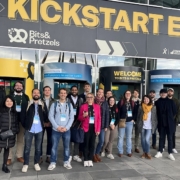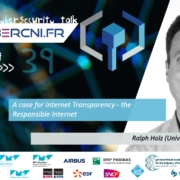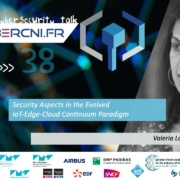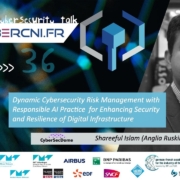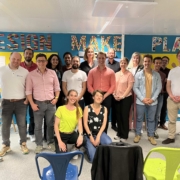[T43] Hacking Innovation: Securing Innovations in the Cyber World – Christian A. Mohr (Tergau&Walkenhorst)
On Fri, March 7th, 2025, 2pm CET, we welcome Christian A. Mohr (Tergau&Walkenhorst), for another edition of TALK.CYBERcni.fr on “Hacking Innovation: Securing Innovations in the Cyber World”. Share and join!
You are cordially invited to join the free live stream on youtube and LinkedIn! Please share the link https://talk.cybercni.fr/42 with your interested friends!
- Trailer: https://youtu.be/hcwimMBKNbE
- LinkedIN Event: https://www.linkedin.com/posts/2pahl_hacking-innovation-protecting-ideas-activity-7303708317829206017-XAZs
- Facebook Event: https://www.facebook.com/events/2627478057642401/
- Youtube: https://youtu.be/MCFpU-MOvVw?list=PLdftPKA9mTfaDJxqwexil2mPhUFIA9ITd
- Stream redirect (for every edition): https://TALK.cyberCNI.fr/stream
Newsletter with invitations: Subscription on https://TALK.cyberCNI.fr
Help us spreading the news
The best talks are those with an interested diverse audience! Therefore, please use the following media to spread the news in your networks:
Thank you!
Abstract
We will explore the essential aspects of patent protection and its significance in protecting innovations and intellectual property. As an experienced patent attorney and IP strategist, Christian will discuss the challenges and solutions in the realm of trust protection when dealing with innovations. We will examine how companies can safeguard their ideas and innovations and which strategies are particularly effective. Additionally, we will look at current trends and best practices in that are crucial for the protection of intellectual property.
Watch the trailer linked above!
Christian A. Mohr
Dr. Christian A. Mohr, born 1979, joined TWIP „Tergau & Walkehorst Intellectual Property GmbH“ as managing equity partner and Chief Visionary Officer in October 2023. Christian is a leading IP manager and strategist with more than 18 years of IP leadership experience. After studying biochemistry, molecular biology and law in Heidelberg, he took his PhD at the Max von Pettenkofer Institute for Virology, at the Genecenter of the LMU in Munich. After his education in a boutique patent law firm in Munich, he became German and European Patent Attorney. Through his journey he was able to counsel companies of different sizes and business models and within different industries, among those drug discovery and generic pharma companies, as well as companies in the medical device and chemical industry, from the large corporate to various start-ups. He entered the Electrolux Group in 2016 and was until recently head of patents of the German patent department, as well as leading the global IP team of about 45 people ad interim. His superpower is that Christian is in addition a certified innovation manager (TÜV) and Scrum Master (CSM). His focus is the agile enablement and development of a sustainable and value-oriented patent organization and strategy. Christian has driven the organisational transformation of IP teams into agile IP rocket teams embracing equality and diversity. Application of agile project development methods and mindsets paved the way for cross-functional IP management, an agile IP organization and negotiation teams under his leadership.
Tergau & Walkenhorst Intellectual Property GmbH
Tergau & Walkenhorst Intellectual Property GmbH (TWIP) is a specialist firm dedicated to intellectual property protection and innovation strategy. With expertise in patents, trademarks, design protection, copyright, and licensing agreements, TWIP provides comprehensive support to help clients safeguard and realize their innovative ideas.
Since 2023, the firm has been operating from offices in Frankfurt, Nuremberg, and Ingolstadt, while also offering remote services and on-site consultations to accommodate client needs.
The Cyber CNI Lecture Series is a free monthly event that typically takes place on the last Friday of the month from 2pm to 3h30pm CET.
The Cyber CNI Speaker series aims to raise awareness and understanding of cyber security issues among all audiences. It aims to enable an ongoing dialogue between experts from industry and academia and the general public (citizens, families, small and large businesses, public organizations, etc.). All of us are concerned.
The events are broadcast live on Youtube (https://talk.cybercni.fr/) and LinkedIn, allowing worldwide remote participation – including a tool to participate in the discussion.
You can add the event calendar via ICS, webcal, HTML.
How the digital transformation is changing our lives
Our society relies more and more on information and operational technologies. Examples include water, energy, heat and cooling supply, communications, healthcare, production and processing of goods, transportation, national security, banking, research and education, and food production.
What all these areas have in common is that they make intensive use of networked distributed computer systems. These systems can be attacked in many ways. This is no longer just a problem for computer “pros” because computer systems are essential to all of us. The effects of “cyber-attacks” range from power outages to the collapse of the health care or banking sectors.
Program and registration: https://talk.cybercni.fr/

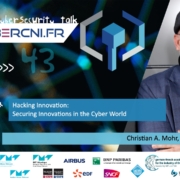
 iStock Photos
iStock Photos